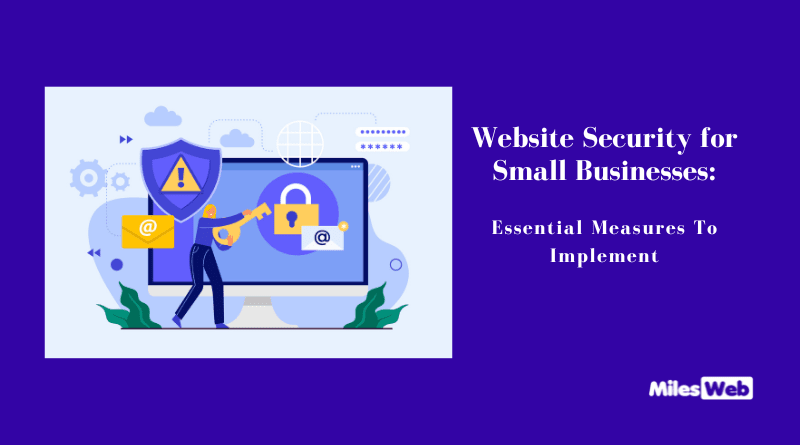In today’s digital age, small businesses heavily rely on their websites to attract customers, showcase their products or services, and facilitate transactions. Web hosting for small businesses now has been an important part, however with the rise of cyber threats and attacks, it has become crucial for small businesses to prioritize website security.
A single security breach can lead to severe consequences, including data breaches, financial loss, damage to reputation, and loss of customer trust. In this blog, we will explore the essential measures that can be easily implemented by the small businesses to enhance their website security and protect their online presence.
Tips to Boost Small Business Web Hosting Security
1. Keep Software Up to Date
Regularly updating software, including the content management system (CMS), plugins, themes, and other applications, is fundamental to maintaining a secure website. Developers often release updates to address security vulnerabilities discovered in their software. By keeping your website’s software up to date, you can effectively patch these vulnerabilities and reduce the risk of exploitation by cybercriminals.
2. Strong Passwords and User Authentication
Enforcing strong passwords and implementing robust user authentication mechanisms is vital to prevent unauthorized access to your website. Encourage your employees and customers to use unique, complex passwords that combine upper and lowercase letters, numbers, and symbols. Additionally, consider implementing two-factor authentication (2FA) to provide an extra layer of security by requiring users to verify their identities through a secondary method, such as a text message or an authentication app.
3. Secure Hosting Provider
Choosing a reliable and secure hosting provider is critical for small businesses. Look for hosting providers that offer robust security features, including firewalls, intrusion detection systems, malware scanning, and regular backups. Deploy your PHP, MYSQL, Python, or Perl websites on high-performance Linux shared hosting India servers for exceptional outcomes.
Additionally, ensure that the hosting provider keeps their server software and infrastructure up to date to protect against known vulnerabilities.
4. SSL/TLS Encryption
Implementing SSL/TLS encryption is essential for securing data transmitted between your website and its visitors. SSL/TLS certificates encrypt sensitive information, such as login credentials, credit card details, and personal data, making it difficult for attackers to intercept and misuse. Displaying the padlock icon and using “https://” in your website’s URL also instills confidence in your visitors, assuring them of a secure browsing experience.
5. Regular Backups
Performing regular backups of your website is a crucial practice that can save your business in the event of a security incident. Backups ensure that you can restore your website to a previous secure state, minimizing downtime and data loss. Implement a backup strategy that includes both off-site and on-site backups, and regularly test the restoration process to ensure its reliability.
6. Web Application Firewalls (WAF)
Web Application Firewalls act as a protective barrier between your website and potential threats by analyzing incoming traffic and filtering out malicious requests. WAFs can block common attack vectors such as SQL injection, cross-site scripting (XSS), and Distributed Denial of Service (DDoS) attacks. Consider implementing a WAF solution either through your hosting provider or as a standalone service for an added layer of protection.
7. Regular Security Scans and Penetration Testing
Conducting regular security scans and penetration tests helps identify vulnerabilities in your website’s infrastructure and application code. Automated scanning tools can identify known vulnerabilities, while penetration testing simulates real-world attacks to assess your website’s resilience. Fixing these vulnerabilities promptly ensures that your website remains secure and provides peace of mind to both you and your customers.
Tips to Get the Reliable Small Business Web Hosting
1. Managed Support
Technical experts of the web hosting company have years of expertise in troubleshooting issues. Whether it is a security patch, server monitoring or the firewall protection. Reliable web hosting companies offer 24×7 technical support.
Email support, phone support, and live chat are some mediums to communicate with clients. It is required because small businesses have less budget to outsource IT teams.
2. Server Uptime
Choose an appropriate web hosting company that offers a higher uptime. It is responsible for a higher website’s performance. 99.95% uptime is considered as the best option that meets industry standards.
3. Clients Trust
Credibility is something that most users trust. Check their social proof and how many customers a web hosting company has served so far.
Conclusion
As cyber threats continue to evolve, small businesses must take proactive measures to safeguard their websites and protect their valuable assets. By implementing the essential security measures discussed in this blog, you can significantly reduce the risk of cyberattacks, maintain customer trust, and ensure the continuity of your business online.
